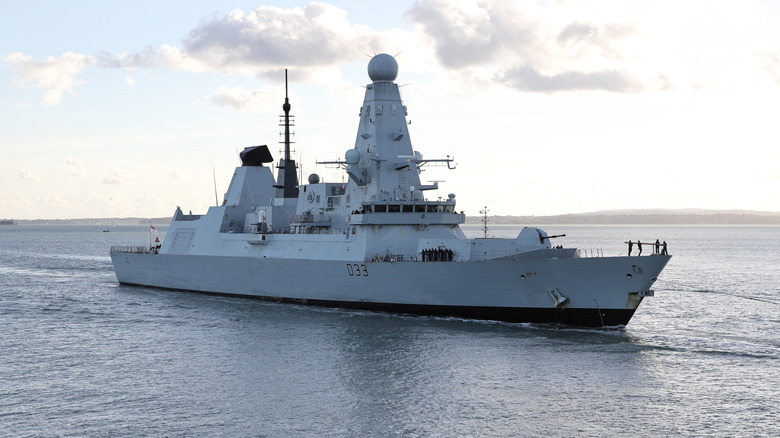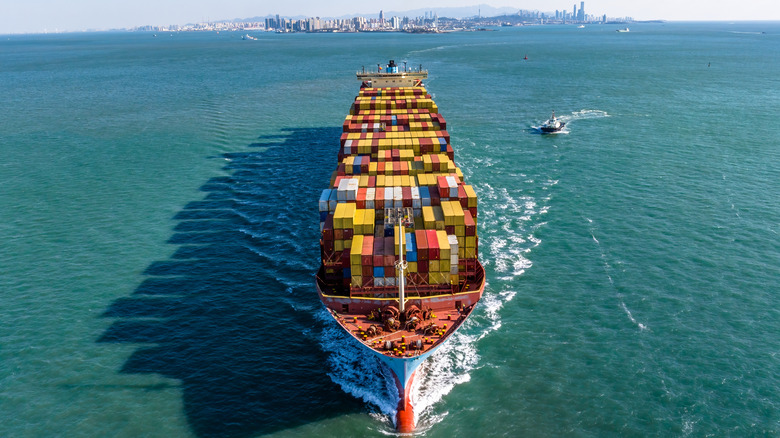As international locations around the globe attempt to tamp down emissions (properly, a few of them, anyway), a significant goal for enchancment is the delivery trade. Ships produce 3% of all of the world’s emissions per 12 months, greater than the entire nation of Japan. There are a variety of choices on the desk for bringing that quantity down, from biofuels to batteries to good old school sails (which are literally photo voltaic panels). However there’s one other one sitting proper there, which has truly been in use for many years: The ability of the atom.
As Bloomberg experiences, a joint effort is underway by Core Energy Ltd, HD Korea Shipbuilding & Offshore Engineering, and Southern Co to begin making industrial ships that run on nuclear. Particularly, they want to incorporate the brand new, cheaper, and theoretically safer sodium quick reactors beneath improvement by TerraPower, one among Invoice Gates’ main investments. If all goes properly, the primary new civilian nuclear ship in many years ought to hit the water in 2035.
After all, that is a giant “if.” First, TerraPower must, , truly construct a working reactor. Even when it does, the ships might want to clear all kinds of regulatory hurdles. Even when the ships can do this, they may even have to get insured. I do not know when the final time you tried to insure a nuclear-powered car was, nevertheless it seems, it isn’t really easy. Even in the event you might get insured, sure international locations do not even permit nuclear ships to dock there in any respect.
There are causes for optimism across the tech, although. Lots of the points which have prevented wide-scale adoption of nuclear up to now are shifting. What’s extra, the U.S. Navy is beginning to poke on the thought once more, and if the Navy begins closely investing once more, civilian ships would possibly simply observe.
The navy would possibly go nuclear (peacefully)
Because the Proceedings of the U.S. Naval Institute factors out, the U.Okay. is already including smaller, fourth-generation nuclear reactors to floor ships in its navy. Proper now, solely plane carriers and submarines run nuclear reactors. For causes of value, nuclear was simply by no means as favorable as gas-turbine engines for many ships, so the tech did not unfold to the remainder of the floor fleet.
If the U.Okay. can change that equation with low-cost reactors, nevertheless, immediately nuclear begins to seem like an incredible choice. For one factor, because of the AUKUS — Australia, U.Okay., U.S. — safety pact, we have already got a system in place for sharing protection expertise with each other, particularly together with nuclear reactor tech. That may let any breakthroughs from both nation simply unfold to the opposite two. What’s extra, America is seeking to improve its nuclear-powered submarine fleet quickly anyway, which might very possible contain new reactor designs. These new designs might theoretically be put into the floor fleet, probably for all three international locations.
The Navy actually wants a heavy energy plant onboard future ships, as a result of the way forward for weaponry is electromagnetic. Present ship-based laser weapons (sure, we stay sooner or later) run at 60 kilowatts, however as they develop bigger and extra highly effective, they may begin requiring megawatts of energy. Railguns, one other rising weapons tech, additionally want completely enormous quantities of energy. Gasoline mills on fashionable floor ships can solely make a lot electrical energy earlier than they run out of gas. Nuclear reactors, against this, would solely should be “refueled” (get new gas rods) as soon as each few many years — and these ships are solely meant to final a number of many years anyway.
So the potential of the navy going nuclear is actual. If it does, then count on issues like port rules begin to shift to permit for these ships to dock there. It additionally will increase the variety of shipyards that may work with the tech. Mainly, the complete infrastructure would get extra nuclear-friendly, opening the door for civilian ships to take the identical path.
The issues, and threats, of civilian nuclear ships
There even have been nuclear-powered civilian ships up to now, although not many. The Soviet Union was first to it, crusing an atomic icebreaker ship within the Nineteen Fifties. America put out a nuclear cargo ship in 1959, the NS Savannah, nicknamed the Peace Ship. Germany adopted in 1964, then Japan in 1969. The Soviet Union bought its personal cargo ship in 1986, not typically thought of the nation’s best 12 months in nuclear energy (Chernobyl).
Right this moment, Russia truly nonetheless operates among the icebreakers, in addition to one lone cargo ship, the NS Sevmorput. All of the others have been retired. They had been simply too costly to function, and plenty of international locations did not need them docking there in any respect. And that was earlier than Chernobyl and Fukushima soured lots of people on the entire thought of nuclear energy.
There are different points which have gotten worse since these days, notably piracy and direct rocket assaults on cargo ships. “Take a look at me: I am the captain now” will get lots scarier when there is a fission reactor onboard that the brand new captain might threaten the world with. And if, say, Houthi rebels or different teams carry on sinking service provider ships, that may grow to be a possible nuclear incident or ten.
Different potential features
However as many local weather activists have lengthy argued, humanity must do one thing to deliver emissions down, and nuclear is a confirmed expertise that is proper there. It supplies a large energy output that primarily does not should be refueled, which saves on long-term prices and retains the ship crusing for for much longer than conventional engines (a container ship wastes one month out of the 12 months simply in refueling time).
Much less appreciated is the truth that nuclear-powered ships are simply quicker. Not as a result of they’re actually quicker, however as a result of they don’t have any downside operating at 100% pace. Trendy ships usually solely run at 60-70% pace as a result of — you guessed it — they’re attempting to preserve gas. Sooner delivery instances are good for enterprise, each for the delivery firm itself that may run extra routes and for the businesses that wish to get their items into warehouses as rapidly as doable.
Core Energy and its companions are a good distance from truly getting a small, low-cost, theoretically safer fourth-generation reactor onto an precise ship. However they could already be in a race. In January 2024, China unveiled plans to construct the only greatest container ship in historical past, which might be powered by a thorium reactor. Thorium is extra environment friendly and extra plentiful than uranium, which present reactors use. Placing thorium right into a reactor is extra sophisticated, although, which is why no one else has pursued the tech. China now claims (with out a lot proof) that it may possibly achieve this. If it is proper, then we could be in yet one more competitors with that nation.




